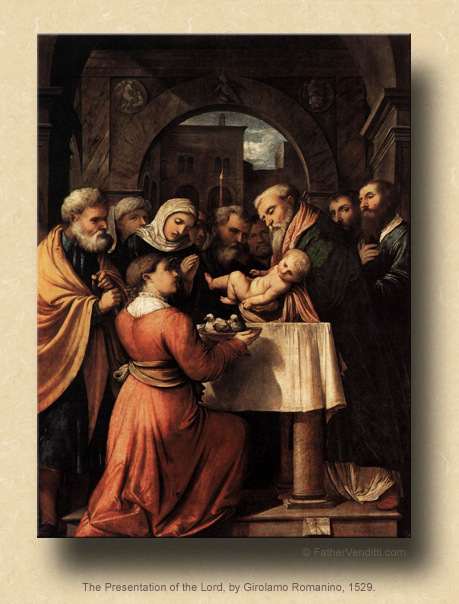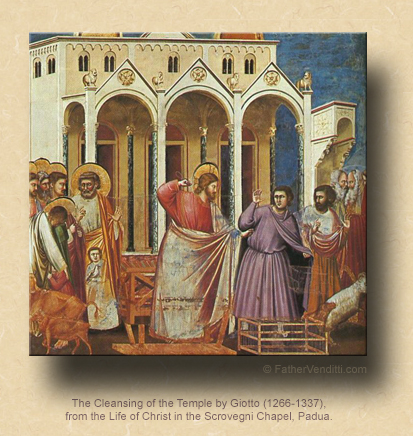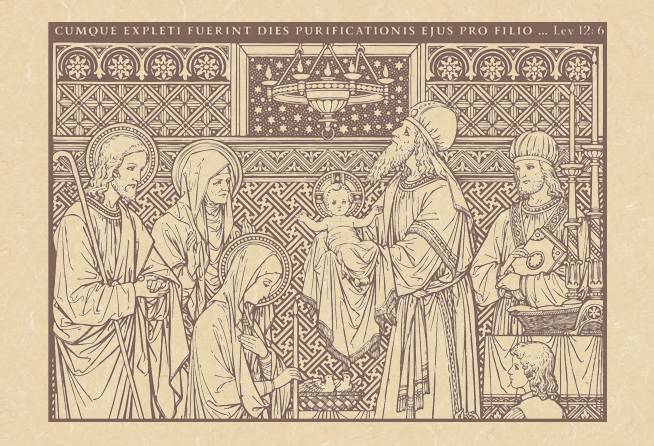The Most Misunderstood Passage in the Bible.
The Memorial of Saint Andrew Dũng-Lạc, Priest, & His Companions, Martyrs.*
Lessons from the primary feria, according to the ordinary form of the Roman Rite:
• I Maccabees 4: 36-37, 52-59.
• [Responsorial] I Chronicles 29: 10-12.
• Luke 19: 45-48.
…or, any lessons from the common of Martyrs for Several Martyrs.
The Third Class Feast of Saint John of the Cross; and, the Commemoration of Saint Chrysogonus, Martyr.**
Lessons from the common "In médio…" of a Doctor of the Church, according to the extraordinary form of the Roman Rite:
• II Timothy 4: 1-8.
• Psalm 36: 30-31.
• Matthew 5: 13-19.
|
If a Mass for the commemoration is taken, lessons from the common "In vitúte…" of a Martyr not a Bishop:
• Wisdom 10: 10-14.
• Psalm 111: 1-2.
• Matthew 10: 34-42.
|
The Twenty-Fourth Friday after Pentecost (the Second of Philip's Fast); a Postfestive Day of the Entrance; the Feast of the Holy Great Martyr Catherine; and, the Feast of the Holy Great Martyr Mercury.***
First & third lessons from the pentecostarion, second & fourth from the menaion, according to the Ruthenian recension of the Byzantine Rite:
• II Thessalonians 3: 6-18.
• Ephesians 6: 10-17.
• Luke 19: 12-28.
• Luke 21: 12-19.
FatherVenditti.com
|
 8:06 AM 11/24/2017 — Those of you who follow me on Facebook know that I have a lot of Facebook friends in Vietnam, as well as many from that country who now live here, so it shouldn't surprise you that the memorial for Father Andrew and the other Vietnamese martyrs has a significance for me; so, even though I want us to reflect on today’s very much misunderstood Gospel lesson, we should first give Father Andrew and his companions their due. 8:06 AM 11/24/2017 — Those of you who follow me on Facebook know that I have a lot of Facebook friends in Vietnam, as well as many from that country who now live here, so it shouldn't surprise you that the memorial for Father Andrew and the other Vietnamese martyrs has a significance for me; so, even though I want us to reflect on today’s very much misunderstood Gospel lesson, we should first give Father Andrew and his companions their due.
Father Andrew is a very great saint, even though he is only one of several Vietnamese martyrs honored on this day. He was born Trần An Dũng in 1795, taking the name Andrew at his baptism, and was ordained a priest on March 15th, 1823. During the persecution against Christians in his country, he changed his name to Lạc to avoid capture, and thus he is memorialized as Andrew Dũng-Lạc (or Anrê Dũng Lạc in Vietnamese). He was beheaded in Hanoi on December 21st, 1839, during the reign of Emperor Minh Mạng. He was beatified by Pope Leo XIII on May 27th, 1899, and canonized by Pope Saint John Paul II on June 19th, 1988. He shares this day with the one hundred seventeen other Vietnamese martyrs who died for their faith over the course of just a few years, eight of whom were bishops, fifty of whom were priests, and the rest devout lay people. So, I would recommend to you that, when you’re feeling persecuted in all the various ways that weigh upon us from time to time, these particular saints—and Father Andrew in particular—could be very powerful intercessors.
For some peculiar reason, the episode of our Lord throwing the money changers out of the Temple is a very popular image of our Lord, probably because it caters to the very Protestant notion that loves our Blessed Lord but hates the institution of organized religion, founded on the curmudgeonly notion that every large institution exists basically to make money. In this narrow-minded perspective, the vendors in the temple area represent to us those who use religion to make a profit, and our Lord driving them out stands for the moral purity of those who love God but hate any kind of religious officialdom. It dovetails nicely with the anti-Catholicism which has always been a part of the American experience, which encourages this idea that true Christianity has nothing to do with the institution of the Church.
I like to throw cold water on these popular misconceptions by taking people back to the feast of the Presentation: Mary and Joseph take the Baby Jesus to the Temple because the Law of Moses requires that every first born male be presented to God along with two pigeons or a pair of turtle doves.  The whole point of the inclusion of the episode in the Holy Gospel—and the Church's celebration of it—is to show the obedience of the Holy Family, and our Lord, to the requirements of the Law, a lesson that our Lord would reinforce several times in His own preaching throughout his public ministry, particularly when he said, “Do not think that I have come to set aside the law and the prophets; I have not come to set them aside, but to bring them to perfection” (Matt. 5: 17 Knox). It was essential, even to our Lord, Himself, that this law be fulfilled; so, where did Joseph get the two birds for the sacrifice? He bought them from a vendor in the Temple, the same kind of vendor that our Lord drives from the Temple in today's Gospel lesson. The whole point of the inclusion of the episode in the Holy Gospel—and the Church's celebration of it—is to show the obedience of the Holy Family, and our Lord, to the requirements of the Law, a lesson that our Lord would reinforce several times in His own preaching throughout his public ministry, particularly when he said, “Do not think that I have come to set aside the law and the prophets; I have not come to set them aside, but to bring them to perfection” (Matt. 5: 17 Knox). It was essential, even to our Lord, Himself, that this law be fulfilled; so, where did Joseph get the two birds for the sacrifice? He bought them from a vendor in the Temple, the same kind of vendor that our Lord drives from the Temple in today's Gospel lesson.
So, the Sunday School interpretation of our Lord's actions, that it's wrong for the Church to make money or host Bingo! games, simply doesn't pass muster. Of course the Church has to make money, otherwise it couldn't exist in the real world; and, if the Church doesn't exist in the real world, then there are no priests, there is no Mass, there are no sacraments, and Grace is not available to us … unless, of course, you're a Protestant who doesn't believe in the priesthood, the Mass, the sacraments or grace.
Our Lord drives the vendors from the outer court of the Temple not because it's wrong for someone to do that kind of work;—without them, people would not be able to perform their religious duties before God—He drives them out because they're doing it in service to the wrong religion. The Blessed Apostle John's account of this event is much more detailed, and includes the rather heated exchanged our Lord has with the temple elders right after He knocks over the tables of the vendors, and when they ask our Lord to justify His actions,  He responds to them by predicting his Passion, declaring that He will die and rise three days later; so, He knows—because He is God—that His death and resurrection will result in the creation of a new religion, one that will complete and fulfill—in fact, replace—the old one. He responds to them by predicting his Passion, declaring that He will die and rise three days later; so, He knows—because He is God—that His death and resurrection will result in the creation of a new religion, one that will complete and fulfill—in fact, replace—the old one.
So, the meaning of our Lord's actions today, and the message of today's Gospel lesson, is not a call to abandon religion in favor of some sort of non-institutional faith that doesn't take up a collection; it's a call to sincerity in our religious practice. We can't buy or bribe our way into heaven, and we all know this; but, sometimes we act as if we think we can: someone who's living an immoral life who tries to make up for it by some kind of philanthropy, or some kind of intense volunteerism, or perhaps even by outward displays of intense devotion. Grace doesn't work that way. The only way to cancel the effect of our sins is to confess them, and then stop sinning, or at least make the attempt. That’s what’s meant as a purpose of amendment: in confession we don’t promise our Lord that we’ll never sin again, because common sense tells us that’s not realistic; but, we do promise Him that we will try our best, and avoid those occasions which experience has shown us leads us into sin.
And there you have the true meaning of our Lord driving the money changers from the Temple: it's a symbolic act meant to remind us we cannot use a clever manipulation of our religion to try and assuage our consciences so that we don't have to change our lives. It's coupled with the re-dedication of the Temple in First Maccabees in our first lesson—the very Temple which our Lord visits today—to remind us that the rules haven't changed, but that we must now begin to live them.

* Some early printings of the Roman Missal Third Edition list this memorial as optional. More recent printings indicate it as obligatory.
** Along with St. Teresa of Jesus, John of the Cross reformed the Order of Mount Carmel, resulting in the creation of the Order of Dicalced Carmelites (meaning "Carmelites without shoes"). A poet, he wrote invaluable treatises on mystical theology, and died in 1591. Together, Teresa (sometimes called "of Avila") and John are referred to as "the Spanish Mystics."
A Roman, Chrysogonus was beheaded at Aquilea under Diocletian in 303.
*** Cf. the footnote in the post here for an explanation of Philip's Fast.
Catherine of Alexandria was a virgin of rare and striking beauty, a member of a noble family. Her qualities had attracted the influential men of the city, the philosophers and even Emperor Maximianus. She was maryred in 305.
Mercury was martyred in Caesarea of Cappadocia under Emperor Decius c. 249-251.
|

